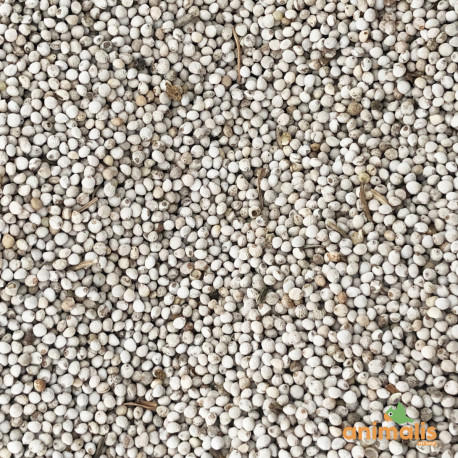- -€3.00




Reference: PERILLABLANC-KG
White Perilla seeds contain about 25% lipids, of which 65% is omega-3 alpha-linolenic acid, a polyunsaturated fatty acid (PUFA): good fat!
Perilla seeds contain about 25% lipids, of which 65% is omega-3 alpha-linolenic acid, a polyunsaturated fatty acid (PUFA): good fat!
White perilla seeds come from Perilla frutescens var. alba, an aromatic plant from the mint family, cultivated in Asia for its culinary and medicinal uses.
Description:
Appearance: small round seeds, from whitish to light beige in color.
Taste: mild, slightly nutty.
Composition: rich in oil (35-45%), proteins, fibers, vitamins (A, E), minerals (calcium, iron, magnesium), and alpha-linolenic acid (ALA, plant-based omega-3).
Main Properties:
Cardiovascular health:
Omega-3s help regulate cholesterol and protect blood vessels.
Anti-inflammatory and antioxidant action:
Reduction of chronic inflammation.
Protection of cells against oxidative stress.
Digestive benefits:
Fibers promote good intestinal transit and improve gut flora.
Respiratory and immune support:
Traditionally used in Asian medicine against asthma, allergies, and chronic coughs.
Seed rich in protein, mainly present in pigeon mixes, appreciated by pigeons.
Niger seeds for birds rich in phosphorus and calcium. Niger seeds (or nyjer seeds) are fine seeds rich in oil. They come from the Guizotia abyssinica (also known as Guizotia oleifera). Niger is highly prized by most birds, and goldfinches and siskins are particularly fond of it.
Niger is one of the few bird seeds with a good calcium/phosphorus ratio.
Spinach seeds contain vitamins A, B1, B2, B3, B7, B9 and C, mineral salts and trace elements. Regular consumption helps to strengthen the feathers.
Radish seeds have antioxidant, detoxifying, draining, and decongestant properties.
Hemp seeds are highly nutritious and contain more essential fatty acids (EFAs) than any other source and are in second place, after soya, for their richness in highly digestible proteins, of high biological value. They are particularly recommended during the breeding seasons in order to stimulate the reproductive instinct of birds.
Buckwheat is a nutritious seed often included in the diet of cage and aviary birds.
- Appearance: Buckwheat is a triangular seed, light brown to greyish in colour, with a slightly rough shell.
Benefits for Birds:
- Balanced Nutrition: Buckwheat offers a combination of proteins, carbohydrates, and fibres, contributing to a balanced diet.
- Energy: The complex carbohydrates provide a sustainable source of energy for the birds' daily activities.
- Digestive System: The fibres promote good digestion and a healthy intestinal regulation.
- Proteins: The proteins in buckwheat support growth, reproduction, and the maintenance of muscle mass in birds.
Clover stimulates the immune system and slows down cellular ageing through its excellent antioxidant properties. Rich in vitamins B, C, E and provitamin A.
Flaxseed is rich in omega 3, which is essential for the cardiovascular system.
Cardi seed is rich in protein and linoleic acid, which helps lower cholesterol levels and therefore reduce heart disease. It is found in budgie and parrot mixes but also for native birds such as bullfinches.
Cardi seeds are high in fat. The amino acid proportions of the seed are very favourable, the arginine content is very high. The seed is low in lysine and methionine + cystine, while tryptophan is completely lacking.
Basil 1kg
Basil contains many antioxidants, is anti-inflammatory, and helps against stress. This does not mean that basil is considered a medicine. Dried basil is of course also different from fresh basil plants. But the fact remains: basil is good for health.
Millet is used in the diet of all birds: straight beaks and hooked beaks. In bunches, it's a treat they love.
Cluster millet has a good protein and carbohydrate content and also contains a large number of amino acids. Ideal for distracting your birds and thus avoiding pecking (feather pulling).
We advised giving red millet for exotic birds. It is richer in protein than yellow millet.

White Perilla seeds contain about 25% lipids, of which 65% is omega-3 alpha-linolenic acid, a polyunsaturated fatty acid (PUFA): good fat!
